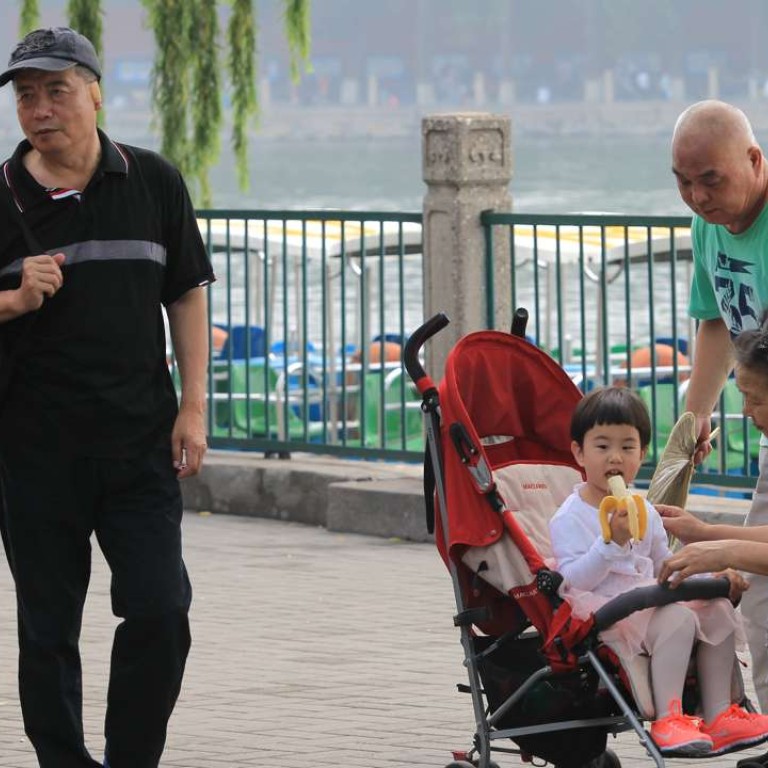
Ageing Beijing: plan to move elderly out of the capital gets cool reception
Trial programme announced to subsidise elderly who move into care homes in neighbouring Tianjin and Hebei as Beijing struggles to cope with growing numbers of senior citizens
The 107 bus stopped at a station in central Beijing and a line of passengers filed on. Some were elderly, including one person with a cane.
The conductor looked hopefully at the seats reserved for people with special needs, but to his disappointment they were already occupied by senior citizens.
The bus conductor then called on passengers to give up their seats for an elderly man and eventually a middle-aged man stood up.
As the bus drove along the Gulouwai Street it was full of passengers, many senior citizens having to stand. Xu Changji, a 72-year-old retired worker, said he now resented going on the bus because there were so many senior citizens travelling and it was hard to get a seat.
“[There are] too many elderly people around here in old central Beijing,” he said.
Xu’s frustration highlights an increasing problem. The population of China’s capital is rapidly ageing.
Nearly 3.15 million registered residents are over 60, according to figures released by the Beijing civil affairs authority last year. That is 23.4 per cent of the registered population. About 80 per cent of the elderly live in central areas of the capital.
Even taking into consideration the influx of migrant labour who do not have permanent household registration, at least 11 per cent of the population are still over 65. More than 500 people turn 60 each day in the capital and more than 120 people turn 80, according to the official figures.

Arrangements will be made so that public medical insurance will cover their expenses in the two districts, the capital’s civil affairs authority said.
Tianjin Wuqing district is one of two areas identified by Beijing to start a pilot programme.
An official with the district civil affairs bureau told the South China Morning Post that a government and private co-funded elderly home near the border between Beijing and Wuqing had been chosen for the scheme, but details were yet be finalised.
Why would I want to leave Beijing to go to Hebei when I have access to all the nice parks here?
One of the aims is to make better use of homes for the elderly in Hebei and Tianjin with spare capacity.
There is huge demand for accommodation in reasonably priced and well run care homes in Beijing, with long waiting lists, and the civil affairs authority has announced that general bookings for public homes for the elderly are closed to most general bookings. Only senior citizens on government support, or who are disabled, over 70 or have no children can still apply.
However, the proposal that more elderly should move out of the city to receive care has not gone down well with some senior citizens.
“I enjoy my retirement in Beijing. I don’t want to go elsewhere,” Xu said. He originally came from a county in Hebei province and worked for a state-owned construction company most of his life. “Even if one day I have to lie in bed watching TV at my home it’s different from a strange elderly care centre in Hebei,” he said.
“I helped build Beijing city and I got a home here. Now if they say I’d better rest in Hebei I feel it’s only because I am retired and of no use.”

Han Yuemei, 66, also said the plans to get more elderly to move out of the city held little attraction.
Han keeps herself busy during her retirement.
She gets up early to make breakfast for her seven-year-old granddaughter. After sending her to school, she goes grocery shopping before meeting her friends in Ditan Park or Beihai Park. As a senior citizen she also enjoys free bus rides and entrance to parks.
“Why would I want to leave Beijing to go to Hebei when I have access to all the nice parks here? Even if I’m old and can’t move around much, I still prefer Beijing because there are so many good hospitals here.”
Lu Jiehua, a professor in the sociology department at Peking University, has little confidence in elderly Beijing residents’ desire to move to neighbouring cities where the environment, services and medical resources can hardly match those in Beijing.
“This is a case of government’s blind willingness with little effect,” Lu said.
“It’s not like moving to Sanya in Hainan Island where you get the clear air and a sea view. The air in Tianjin and Hebei are just as bad, if not worse than in Beijing. Why should they go?
“Elderly people will only feel they are unwanted and the target of population relocation campaign.”
Lu said the government could achieve better results if it focused on providing differential care. Some only need to go to a centre during the daytime for company and meals, while others need home services, but trying to lure them away with subsidies was not good enough, Lu said.

